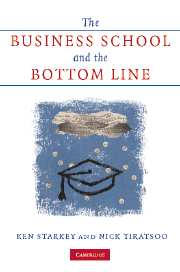Book contents
- Frontmatter
- Contents
- List of tables
- Acknowledgements
- Prologue
- 1 Introduction
- 2 The development and diffusion of the business school
- 3 Business schools in the era of hyper-competition: ‘more “business” and less “school”’
- 4 Business school education
- 5 Business school research
- 6 Experiments and innovations
- 7 Imaginary MBAs
- 8 Business school futures: mission impossible?
- Epilogue
- Index
4 - Business school education
Published online by Cambridge University Press: 02 December 2009
- Frontmatter
- Contents
- List of tables
- Acknowledgements
- Prologue
- 1 Introduction
- 2 The development and diffusion of the business school
- 3 Business schools in the era of hyper-competition: ‘more “business” and less “school”’
- 4 Business school education
- 5 Business school research
- 6 Experiments and innovations
- 7 Imaginary MBAs
- 8 Business school futures: mission impossible?
- Epilogue
- Index
Summary
Business schools have always prided themselves on the quality of their education, their ability to fashion successive generations of students who are thoroughly prepared for the rigours of the outside world, whether in business, government or elsewhere. In the light of the previous chapters, it is obviously pertinent to ask how this much-toted mission is currently bearing up. To be specific, is the recent spate of negative publicity, allied to the strong growth of competition, forcing the schools to sharpen up their acts, and perhaps respond constructively? Or is it instilling into them a fear of failure and reluctance to experiment, and so ultimately producing nothing but stultifying conformity?
Comment on these matters is certainly plentiful at present, and, in fact, hardly a week goes by without a story appearing in the press about business school teaching and curricula. Reading this material indicates no obvious consensus, however. The schools themselves, unsurprisingly, almost always stress their dynamism. The standard line is that they are alive to the challenges and ready to embrace fundamental changes – that is, if they have not embraced them already. In a much-trailed article published in late 2004, no less a figure than Laura D'Andrea Tyson, dean of London Business School, announced a bout of soul-searching, designed to determine her institution's ‘role in the education of the next generation of business leaders’. The impetus, she explained, was a growing suspicion that ‘our customers “had issues” with our products’, and a recognition that ‘[w]e needed to understand why, and whether we were offering what they, and other employers throughout the world, needed’.
- Type
- Chapter
- Information
- The Business School and the Bottom Line , pp. 77 - 114Publisher: Cambridge University PressPrint publication year: 2007

